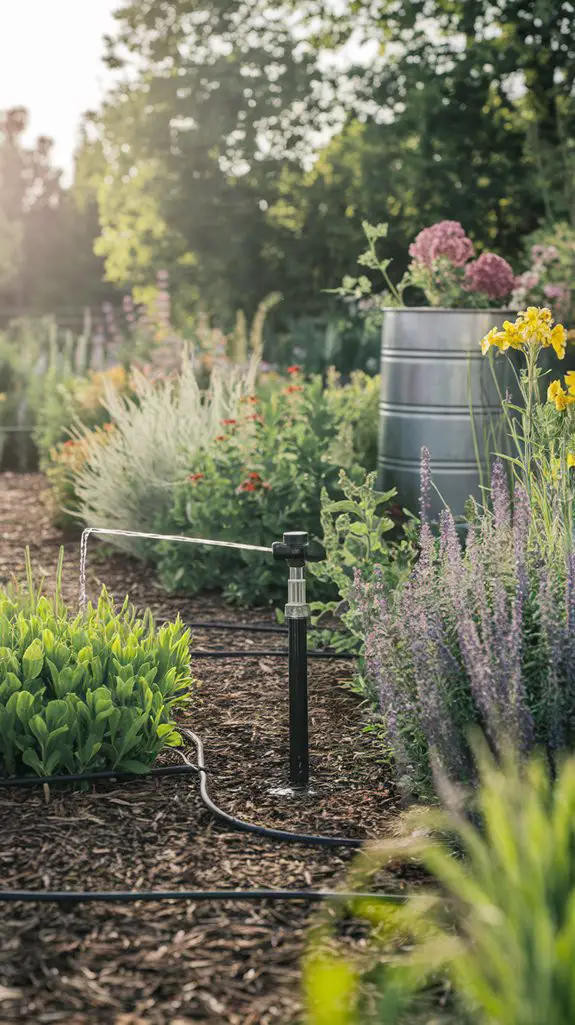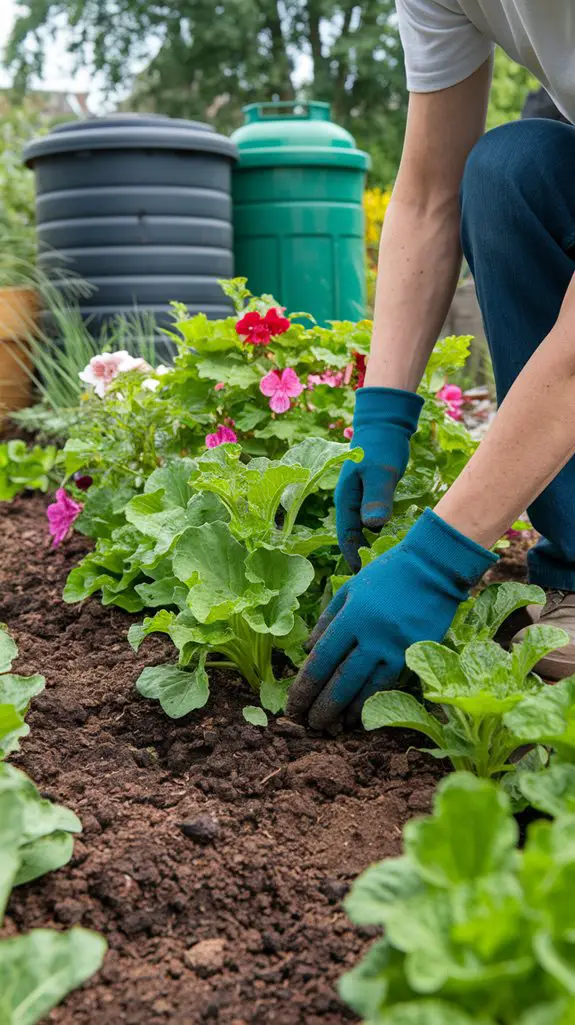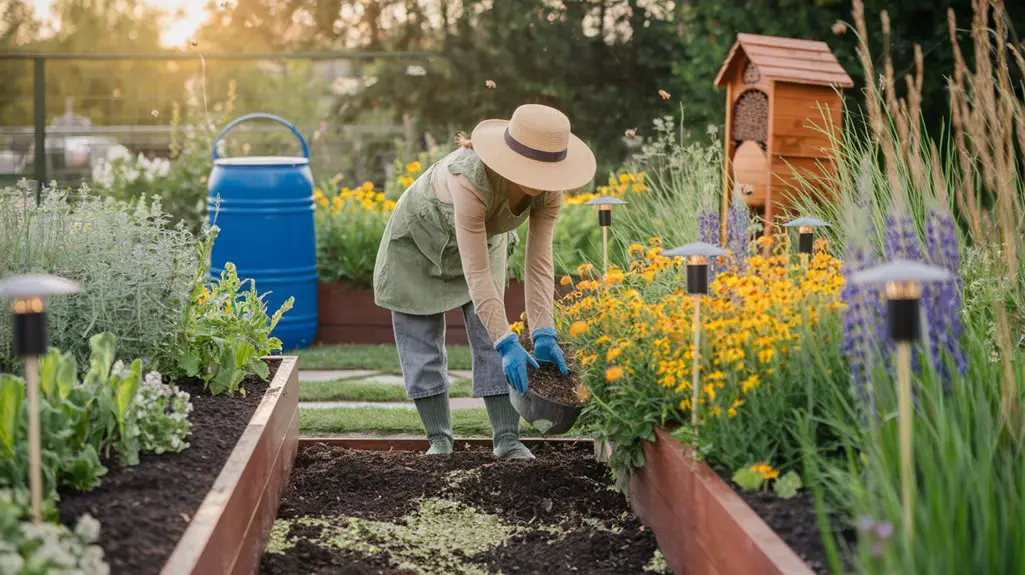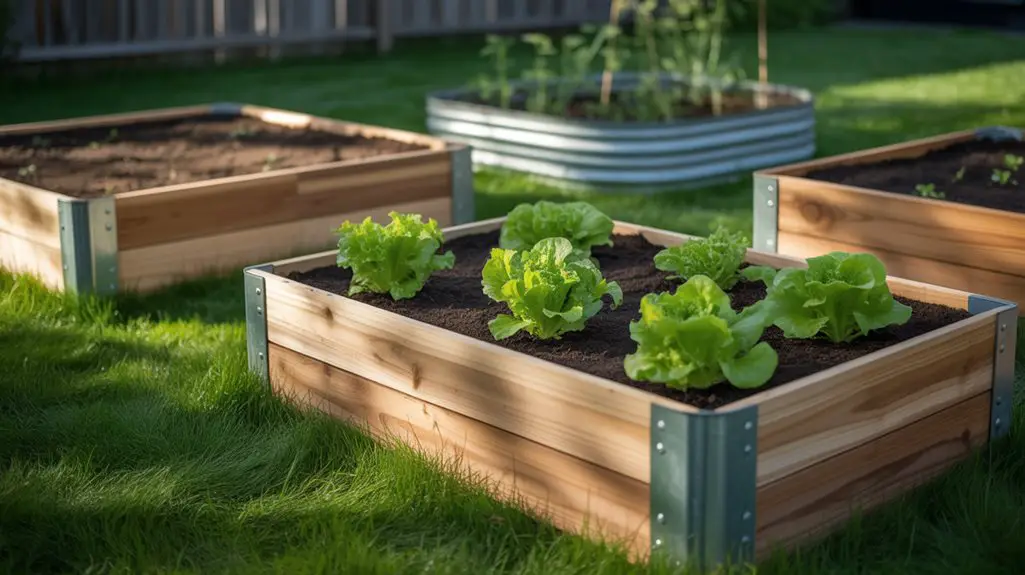Did you know that sustainable garden maintenance can reduce your household's carbon footprint by up to 30%? When you switch to organic practices, you'll protect local water systems from chemical runoff while creating a thriving habitat for beneficial insects and wildlife. You'll also save money through reduced water usage, fewer purchased inputs, and healthier plants that resist disease naturally. The benefits extend far beyond your garden fence—all while you create your own personal ecosystem.
Environmental Benefits of Sustainable Garden Maintenance
When you adopt sustainable garden maintenance practices, you're creating a positive ripple effect that extends far beyond your property lines.
Your garden becomes a carbon sink, absorbing CO2 and releasing oxygen, directly combating climate change.
By eliminating chemical fertilizers and pesticides, you're preventing harmful runoff into local waterways, protecting aquatic ecosystems.
You're also preserving soil health, encouraging beneficial microorganisms that naturally cycle nutrients.
Sustainable gardens create essential habitats for pollinators, whose populations have declined dramatically.
Incorporating native plants and diverse plantings enhances your garden's ability to attract a variety of pollinators, whose populations have declined dramatically.
Your native plants, diverse plantings, and chemical-free spaces become sanctuaries for bees, butterflies, and birds crucial to our food systems.
Water conservation techniques like mulching and rainwater harvesting reduce pressure on municipal supplies while replenishing groundwater reserves naturally.
Each sustainable choice contributes to a healthier, more resilient environment.
Water Conservation Strategies for Garden Sustainability

As freshwater becomes an increasingly precious resource worldwide, implementing effective water conservation strategies in your garden isn't just environmentally responsible—it's essential for long-term sustainability.
You'll maximize efficiency by installing drip irrigation systems that deliver water directly to plant roots, reducing evaporation by up to 60%.
Collect rainwater in barrels connected to downspouts—a free, chemical-free resource that plants thrive on. Choose drought-tolerant native species that require minimal supplemental watering once established.
Apply organic mulch 2-3 inches thick around plants to retain soil moisture, suppress water-hungry weeds, and gradually improve soil structure.
Water deeply but infrequently to encourage deeper root growth, and do so in early morning or evening when evaporation rates are lowest.
These practices support biodiversity while dramatically reducing your garden's water footprint. Additionally, incorporating harvesting rainwater techniques can further enhance your garden's sustainability by utilizing natural precipitation effectively.
Soil Health Management for Long-Term Garden Success

Healthy soil forms the foundation of any thriving, sustainable garden, serving as a living ecosystem that nourishes plants while sequestering carbon and supporting beneficial organisms.
To maintain this essential resource, you'll want to incorporate regular soil testing to monitor pH and nutrient levels.
Add organic matter through composting kitchen scraps and yard waste, which improves soil structure while reducing landfill waste. By utilizing kitchen scraps in your compost, you can create nutrient-rich soil amendments that enhance plant growth and vitality.
Avoid synthetic fertilizers that disrupt soil biology; instead, use natural amendments like bone meal or seaweed extract when necessary.
Practice no-till gardening techniques to preserve soil structure and fungal networks.
Cover bare soil with mulch or cover crops to prevent erosion and suppress weeds.
Remember that healthy soil requires less water, fertilizer, and pest control—making your garden both more resilient and less resource-intensive.
Natural Pest Control Methods That Protect Ecosystems
Natural pest control represents a vital shift away from harmful chemical pesticides toward methods that work in harmony with existing ecosystems. When you embrace these techniques, you're not just protecting your garden but supporting entire local food webs.
- Companion planting pairs pest-repelling plants like marigolds and basil with your vulnerable crops.
- Beneficial insect attraction through diverse flowering plants creates natural predator-prey balances.
- Physical barriers such as row covers and copper tape prevent pest access without chemicals.
- Homemade solutions like neem oil sprays and garlic infusions target specific pests without residual harm.
- Strategic timing of plantings helps crops evade peak pest pressure seasons.
These approaches maintain essential soil microbiomes and protect pollinators while effectively managing unwanted visitors in your sustainable garden ecosystem. Additionally, incorporating essential plants for organic pest control can enhance the effectiveness of your pest management strategies.
Reducing Garden Waste Through Composting and Recycling
While protecting garden ecosystems from pests represents one pillar of sustainability, the management of garden waste forms an equally significant part of eco-friendly gardening practices.
You'll discover that composting transforms kitchen scraps and garden trimmings into nutrient-rich soil amendments, eliminating the need for synthetic fertilizers. Start by collecting fallen leaves, grass clippings, and vegetable waste in a dedicated bin. Layer these materials properly, maintaining the right moisture balance for ideal decomposition. Incorporating organic materials into your compost can significantly enhance its nutrient content.
Beyond composting, reuse garden materials whenever possible. Turn pruned branches into mulch, repurpose old containers as planters, and create wildlife habitats from fallen logs.
These practices not only reduce landfill waste but also complete nature's cycle, returning nutrients to your soil while promoting biodiversity in your garden ecosystem.
Energy-Efficient Tools and Techniques for Modern Gardeners
As gardening evolves in our resource-constrained world, choosing energy-efficient tools and techniques has become essential for reducing your environmental footprint.
Today's eco-conscious gardener has numerous options that minimize resource use while maximizing garden health.
- Select manual tools like push mowers and hand pruners that require no fuel and provide exercise
- Invest in electric equipment powered by renewable energy instead of gas-powered alternatives
- Employ drip irrigation systems that deliver water directly to plant roots, reducing waste by up to 70%
- Install solar-powered garden lights and pumps to harness free energy from the sun
- Embrace smart controllers that adjust watering schedules based on weather forecasts and soil moisture
Incorporating rainwater systems into your design can further enhance sustainability by efficiently collecting and utilizing natural resources.
These approaches not only conserve precious resources but also create quieter, healthier spaces that support local biodiversity.
Conclusion
You're making a profound difference when you embrace sustainable gardening. Did you know that composting can divert up to 30% of household waste from landfills? That's thousands of pounds annually transformed into rich soil instead of methane-producing trash. By conserving water, nurturing soil health, and choosing natural pest control, you're not just growing plants—you're cultivating a resilient ecosystem that supports biodiversity and protects our planet's future.




